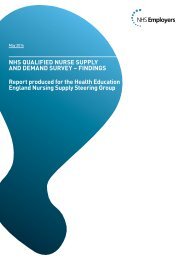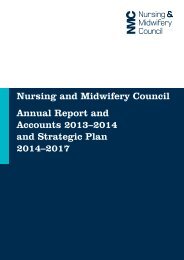Journal_1_2014_final_WEB
Journal_1_2014_final_WEB
Journal_1_2014_final_WEB
Create successful ePaper yourself
Turn your PDF publications into a flip-book with our unique Google optimized e-Paper software.
Nutrition Intervention<br />
Ultimately, the nutrition assessment will lead to a nutrition<br />
diagnosis, followed by the necessary nutritional support.<br />
Early nutrition intervention and subsequent monitoring<br />
of the nutrition plan can reverse poor outcomes associated<br />
with undernutrition and promote healing. Caloric,<br />
protein, and fluid requirements should be individualised<br />
and either increased or decreased, depending on the assessed<br />
requirements of each patient. Furthermore it should<br />
be determined when fortified foods and/or ONS should<br />
be incorporated into the treatment plan. Fortified foods<br />
include commercial products, such as cereal, soup, cookies,<br />
or dairy products enriched with additional calories and<br />
protein, or enriched menu items.<br />
Of course, the nutritional intervention strategy always<br />
tries to focus first on improving normal oral nutritional<br />
intake. However, despite many daily efforts towards this<br />
goal, for example by taking into account individual preferences<br />
for foods and drinks and improving mealtime<br />
ambiance, it is known that many patients with chronic<br />
wounds like PUs cannot meet their nutritional demands<br />
via normal intake only.<br />
When normal oral intake is inadequate to promote<br />
healing, enteral or parenteral nutrition is considered if it<br />
is consistent with the individual’s goal. When the gut is<br />
functioning, enteral feeding via oral nutritional supplements<br />
in addition to the diet or total tube feeding is the<br />
preferred route.<br />
Research supports the theory of providing ONS to reverse<br />
undernutrition, prevent PU occurrence, and promote<br />
PU healing. 42-44 ONS given in addition to the regular diet<br />
should be preferably consumed between meals so that it<br />
does not negatively affect normal intake.<br />
Arginine-enriched oral nutritional<br />
supplements and pressure ulcer healing<br />
– what’s known?<br />
Considering nutritional intervention and the prevention of<br />
PUs, adequate nutrition, meaning the intake of adequate<br />
amounts of protein and energy, seems to reverse the common<br />
underfed status of PU-prone patients and protect<br />
against ulcer formation. 24,44 With regard to nutrition and<br />
healing of PUs, there is a gradual accumulation of evidence<br />
indicating that meeting the patient’s calorie and protein<br />
requirements improves the rate of wound healing. Intake<br />
of supplements or tube feeding with a high content of<br />
protein has been described to improve the rate of wound<br />
healing. 45,46,47<br />
34<br />
Particularly interesting are studies performed with arginine-enriched<br />
nutritional supplements. Benati et al. tested<br />
a PU-specific nutritional supplement that was high in energy<br />
and protein and enriched with arginine, vitamin C,<br />
and zinc, and found a positive effect on wound healing. 48<br />
Subsequently, these findings were confirmed in an open<br />
multicentre study conducted in Belgium and Luxembourg<br />
(n=245 patients) and in a small randomised controlled trial<br />
(n=28 patients) including several tube-fed patients. 49,50<br />
In the CUBE study, a randomised controlled trial (n=<br />
43 patients), van Anholt et al. observed significantly faster<br />
wound healing in non-malnourished patients (aged between<br />
18 and 90, with a normal BMI and no undesired<br />
weight loss) with stage III or stage IV pressure ulcers who<br />
received the same oral nutrition as controls, but supplemented<br />
with arginine, protein, zinc, ascorbic acid, and<br />
vitamin E. 5<br />
Robust evidence for the independent role of these specific<br />
micronutrients within a high-calorie, high-protein<br />
oral nutritional support came recently from the large<br />
(n=157), randomised, and controlled OligoElement Sore<br />
Trial (OEST). In this multicentre study, Cereda and collaborators<br />
found that, in malnourished patients with stage<br />
III or stage IV pressure ulcers, an 8-week supplementation<br />
with an oral formula enriched with arginine, zinc,<br />
and antioxidants resulted in faster healing (increased by<br />
20%) than an isocaloric-isonitrogenous control nutritional<br />
support. 51 Both the CUBE study and the OEST trial additionally<br />
found a positive cost effect, because in both<br />
studies significantly fewer wound dressings were used in<br />
the intervention group with less overall nursing time required<br />
for dressing changes. This finding is very relevant<br />
at a time when awareness of the costs of health care has<br />
become increasingly important.<br />
Arginine enriched oral nutritional<br />
supplements and healing of other types<br />
of chronic wounds – what’s known?<br />
Arginine-enriched nutritional supplements may also have<br />
a positive effect on the healing of other types of chronic<br />
wounds, such as venous leg ulcers, arterial leg ulcers, and<br />
diabetic foot ulcers. However, at the present time there are<br />
only case reports on these applications. 52 Therefore, more<br />
research in this field should be performed.<br />
Conclusion<br />
Nutrition is a key element in the prevention and treatment<br />
of patients with (chronic) wounds such as pressure ulcers.<br />
Nutritional care has to be incorporated into integrated and<br />
multidisciplinary wound care performed by a dedicated<br />
professional team. <br />
m<br />
EWMA <strong>Journal</strong> <strong>2014</strong> vol 14 no 1




